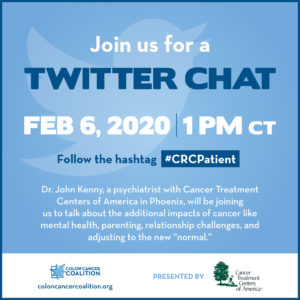What is a Twitter Chat?
A Twitter Chat is a running conversation on Twitter during a set time that revolves around a predetermined topic. The Twitter Chat can be found, followed, and contributed to by using a designated hashtag. For this Twitter Chat series presented by Cancer Treatment Centers of America it will be #CRCPatient.
Why participate in a Twitter Chat?
Participating in a Twitter Chat lets you be part of an important conversation, and allows you to pull up a seat at the table next to survivors, providers, organizations, and institutions. It is your chance to have your voice heard and to make your experience and work matter. It is also a great way to connect with others in the shared space who have a vested interested in the cause.
How to participate in a Twitter Chat?
For one hour, anyone interested is welcome to be part of the discussion topic of the Twitter Chat. Every Twitter Chat has a topic, and the questions asked revolve around this. It’s easy to join by following and using a designated hashtag which will be promoted in advance and used with very question asked.
There are a set number of predetermined questions that will be presented in scheduled increments. In this Chat, each question will be preceded with “Q1” through “Q8,” and participants can retweet with an answer appropriately labeled “A1” through “A8.” The Colon Cancer Coalition will be asking the questions from their Twitter account (@gyrig) and everyone should retweet any question they want to answer with their response so their answer makes sense.
Feel free to attach any resources, links, or photos in your response that will help support your answer. Responding to the questions live during the Twitter Chat is not a requirement for participation. We hope others will join in the hours and days after the Chat, as the responses reverberate throughout Twitter.
For this chat on Thursday, February 6, 2020, we’ll be discussing non-medical and psychosocial issues that can impact the lives of patients and caregivers with Dr. John Kenny, psychiatrist with Cancer Treatment Centers of America in Phoenix.
Twitter Chat Questions:
Q1: There is a stigma around openly discussing mental health. If a patient is hesitant to talk to their oncologist about issues they may be having with depression and anxiety brought on by their diagnosis, how can they go about getting help? #CRCPatient
Q2: What role can online support like social media and patient communities play in mental health support? #CRCPatient
Q3: Chemo brain is real, and can be a limiting and embarrassing long term side effect. How can a survivor cope with chemo brain as part of their “new normal,” especially in situations where they may not want to disclose this history with cancer? #CRCPatient
Q4: One thing patients frequently encounter is the surprising change in friendships/relationships after a diagnosis. How can a patient cope with the loss or disappointment from people they relied upon before cancer? #CRCPatient
Q5: While the patient goes to their oncologist for care, where can a caregiver go to have their cancer-related needs met like caregiver burnout, mental health struggles, psychosocial support, career, and peer support? #CRCPatient
Q6: Patients and their partners can both feel the equal strain and stress of cancer. What can couples do during and after treatment to help their relationship stay the course amidst the storm of cancer? #CRCPatient
Q7: What advice or resources would you give parents facing cancer to help them help their children navigate the changes that cancer brings for their family? #CRCPatient
Q8: Cancer can force a patient and caregiver to scale back or suspend their career. This can leave gaps in resumes, create concern about job security, and add to their financial burden. What advice/help is out there for patients/caregivers concerned about work. #CRCPatient

